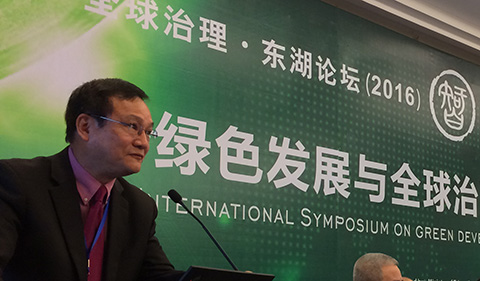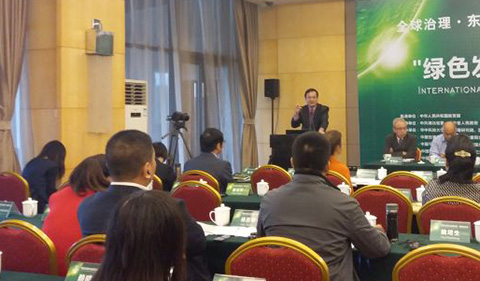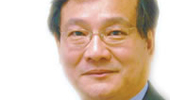
Dr. Jieli Li at International Symposium on Green Development and Global Governance in Wuhan, China, November 2016
Dr. Jieli Li, Professor of Sociology at Ohio University, was invited to deliver his research talk entitled “Environmental Justice and Green Development” at Dong Hu forum – an international symposium on Green Development and Global Governance held at Wuhan, China in Nov., 12-13, 2016.
Environmental Justice and New Horizon of Development
In his talk, Li defines environmental justice as a core of green development that embraces a multi-layered relationship that crisscrosses not only between humans and the environment, but also between humans and technology and between technology and the environment.
Li points out that environmental justice takes us to a new horizon of development in which there is a fundamental change of human’s attitude toward nature – from treating nature as an object of manipulation or conquest to treating it as equal for respect and fairness.
Paradigm Shift
In the sociology of development, an era of major paradigm shifts is developing, ranging from perception and assessment to the mode of governance, Li says. There are three trends of paradigm shift:
- A shift of the way development is assessed: from one-dimensional economic development to a multi-dimensional green, sustainable development. Conventional paradigm of development revolves primarily around development economics centering on economic development and modernization-driven poverty-reduction (to be assessed by Gross Domestic Product, Gross National Product, and Gross National Income). The new paradigm of green development features an interdisciplinary-based concept of sustainability that emphasizes a balanced development of three Es –- Economy, Ecology, and Equity (to be assessed by the United Nations Human Development Index, the Environmental Performance Index, and Ecological Footprint assessment).
- A shift of the value-consensus on accountability and responsibility: from shareholder value to stakeholder value. Conventional shareholder value is primarily self-interest-oriented, and the agent that holds a shareholder value is only accountable and responsible for one group of interested parties directly involved in a project, and in the business world, for the collective owners of a company only. The shareholder value tends to pursue the immediate returns and hold short-term goals. By contrast, new stakeholder value is primarily collective-interest-oriented, and the agent is held accountable and responsible not merely for those directly involved parties of interest in a project, but also for those parties that are not involved in but would be affected by the concerned project, say, public health and clean environment. The stakeholder value tends to hold long-term goals and the well-being of society at large.
- A shift of the mode of governance: from vertical relationship (state-centered) to horizontal relationship (community-centered). The conventional mode of development governance features the process of state-centered policy making and implementation through a top-down approach by which the driver of development is more of the sector of state/government than that of the market and community.

Dr. Jieli Li speaking at Dong Hu Forum on Green Development and Global Governance
Development Governance
A new mode of development governance turns its focus to the non-state sectors such as the market and community, Li says. The rising tides of CSR (corporate social responsibility) and social entrepreneurship, community capability and entitlement development, New Social Movements, and International Non-Governmental Organizations represents such a shift in the 21st century.
Li concludes that green-oriented development has become a global consensus, and such new normal is fully exemplified by the United Nations’ 2030 Agenda for Sustainable Development (2015) and Paris Agreement on Climate Change (2016) signed by leaders of nearly two hundred countries in the world.
The 2030 Agenda forms the new global development framework anchored around 17 Sustainable Development Goals (SDGs) with a total of 169 targets covering economic, social development and environmental protection.
On the other hand, he says the Paris Agreement commits world leaders to keeping global warming below 2C, and all indicates a concrete and promising step toward a low-carbon world for sustainable development.



















Comments